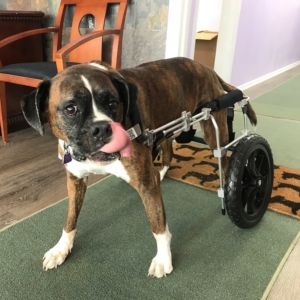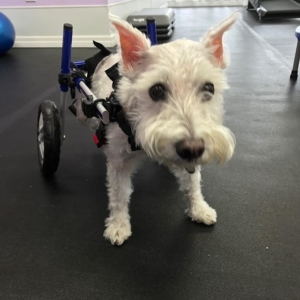What is intervertebral disc disease (IVDD) or herniated disc in dogs?
Just like people, pets can develop herniated or “slipped discs.” This condition is called “intervertebral disc disease” in the veterinary world.
The intervertebral discs sit between the vertebrae of the spinal cord and function to
(1) keep the backbones from touching one another, and
(2) protect the spinal cord.
However, the outer portion of the disc can break down over time – when this happens, the inner part of the disc can break through and damage the spinal cord. This results in PAIN, damage to the nerves, and even paralysis.
What are signs of intervertebral disc disease (IVDD) in a dog?
You may notice that your pet cries out when picked up and keeps looking at their back, has difficulty walking with both back legs or all four limbs, demonstrates a hunched posture, or refuses to jump or go up/down stairs. Your pet may demonstrate resistance to moving their head or neck and simply shift their eyes to look at you.
How does acupuncture treat herniated disc disease?
Acupuncture involves putting very tiny needles into precise locations that are anatomically known to have a junction of nerve bundles, arterioles, and venules – these points are the intersection of information for the nervous system and more in your pet!
In the cases of intervertebral disc disease, acupuncture points are chosen based on their location to major spinal nerves of the body. By placing the needles at these locations, the body releases endorphins, norepinephrine, and anti-inflammatory mediators and allows the body to heal itself naturally (while releasing a “feel-good” sensation). Like humans, most animals fall asleep during their treatments.
Why consider acupuncture for your pet with a herniated disc?
Studies have demonstrated that dogs with herniated discs recover more quickly from the event when acupuncture is added to their treatment plan, versus just Western treatment/surgery (1; 2). In fact, in one of these studies, dogs who received acupuncture were able to walk sooner than those who did not!
Additionally, in many cases, your pet may have back pain and the suspicion of a herniated disc, but your veterinarian or veterinary neurologist may not recommend surgery at that time– acupuncture is a modality your pet needs in order prevent pain and help calm the nerves of the spinal cord!
Also, it is important to note that not all pets are able to undergo anesthesia for surgery – acupuncture is a great option for these pets.
What if my pet has had IVDD/back surgery – can they still benefit from acupuncture or physical therapy?
Yes! Studies have demonstrated that dogs with herniated discs recover more quickly from the event when acupuncture is added to their treatment plan, versus only Western treatment/surgery (1; 2). In fact, in one of these studies, dogs who received acupuncture were able to walk sooner than those who did not!
Additionally, pets who undergo physical therapy after surgery heal and return to full ambulation more quickly than those who do not undergo physical therapy.
Why should I consider physical therapy for my pet with intervertebral disc disease?
Passive range of motion and massage can be exceptionally important in keeping your pet pain-free and physically comfortable. These therapies can help promote circulation.
Laser therapy can encourage blood flow to the area – allowing for increased healing, as well as relief from pain.
Underwater treadmill therapy allows for a low-impact joint environment that is safe for your pet to exercise in order to regain muscle mass. One minute working out in water is similar to 3 minutes of working out on land!
Should I consider a wheelchair for my pet?
We get this question a lot! It really depends on how your pet is ambulating and your goals for your pet. We provide wheelchair fitting and ordering services and can help you make this decision.
It is very important that the wheelchair is specially fitted to your pet in order to achieve normal biomechanics, avoid unnecessary discomfort, and avoid the formation of pressure sores.
Works Cited:
- Hayashi et al. (2007). Evaluation of electroacupuncture treatment for thoracolumbar intervertebral disk disease in dogs. JAVMA 231 (6): 913-918.
- Joaquim et al (2010). Comparison of decompressive surgery, electroacupuncture, and decompressive surgery followed by electroacupuncture for the treatment of dogs with intervertebral disk disease with long-standing severe neurologic deficits. JAVMA 236 (11): 1225-1229.









[…] [1]: https://healingpawsfl.com/treat-intervertebral-disc-disease-dog/ […]